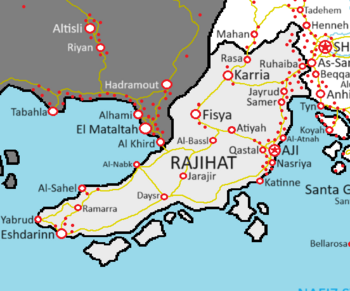Rajihat
Holy Rajit Republic بهينيا | |
|---|---|
|
Flag | |
 | |
| Capital and largest city | Aji |
| Official languages | Emmirian, Rajit |
| Religion | Rajitism Islam |
| Demonym(s) | Rajit |
| Government | Federal parliamentary republic |
| Ahmed Rahari | |
| Population | |
• 2022 estimate | 8,252,000 |
| Gini | 22 low |
| HDI | 0.674 medium |
| Currency | bet |
The Holy Rajit Republic, commonly referred to as Rajihat, is a nation in southeastern Adula, bordered by Emmiria and Verdusa with a southern coastline along the Emmiria Sea. Its capital and largest city is Aji, with other major settlements including Karria, Fisya, and Eshdarinn. Rajihat is named for Rajitism, which is practiced by more than 85% of the population of 8.25 million.
Part of the geographical and cultural region known as the Holy Land, over the ages the region was ruled by powers such as the Emmirians, Quetanans, Skithans, and Behinians. In the Middle Ages, it was part of the Islamic Caliphates of Emmiria. In the 17th century, tensions between religious groups led to a mass exodus and a demographic shift led to a Rajit-majority population. Rajihat was granted an autonomous government within the Islamic Republic of Emmiria in the early 20th century, led by a Rajit governing board. A nationalist movement after the World War led to the Emmirian government granting Rajihat and Verdusa independence in 1957, with Rajihat becoming a democratic theocracy under Rajitism. In 1976, fundamentalist Rajit political parties took control of parliament and began sponsoring Rajit nationalist groups abroad, mainly in Verdusa. One of these groups, the Rajit Liberation Army, triggered the Verdusa Civil War, and in its aftermath the two countries became bitter rivals. After the ascension of prime minister Ahmed Rahari in 2016, tensions rose dramatically and reached new heights in 2024 as a military standoff and border crisis ensued.
Rajihat is a developing country with fomented political instability and a struggling economy, largely due to the 1982 oil crisis, Verdusan civil war, widespread resource shortages, and international sanctions. Its legislature has largely become symbolic due to martial law being imposed since 2017 and the dissolution of the constitution in 2023.